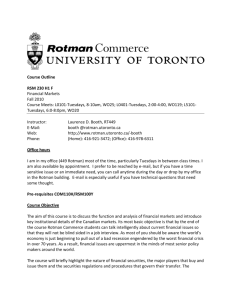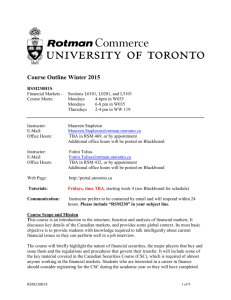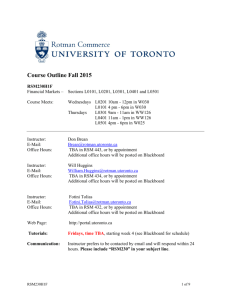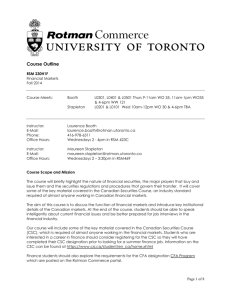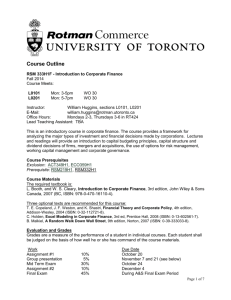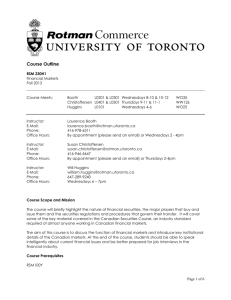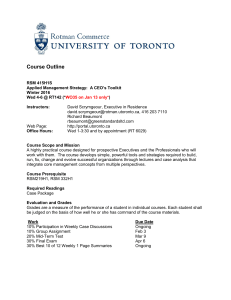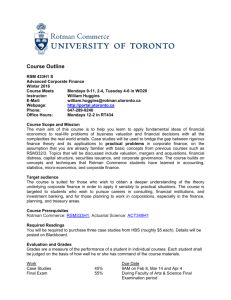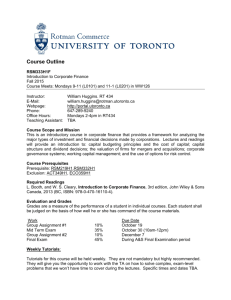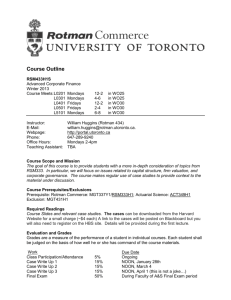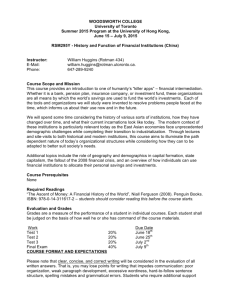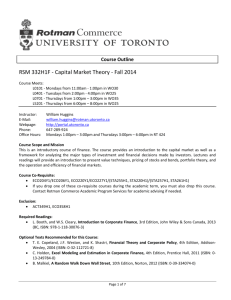Course Outline - University of Toronto
advertisement
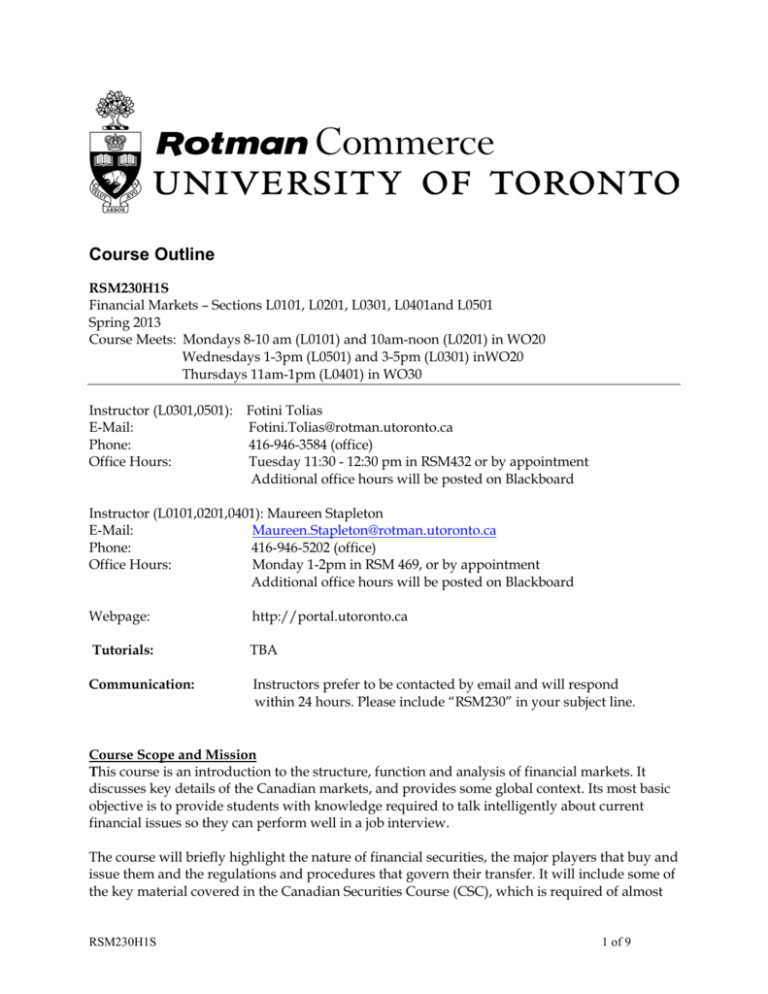
Course Outline RSM230H1S Financial Markets – Sections L0101, L0201, L0301, L0401and L0501 Spring 2013 Course Meets: Mondays 8-10 am (L0101) and 10am-noon (L0201) in WO20 Wednesdays 1-3pm (L0501) and 3-5pm (L0301) inWO20 Thursdays 11am-1pm (L0401) in WO30 Instructor (L0301,0501): Fotini Tolias E-Mail: Fotini.Tolias@rotman.utoronto.ca Phone: 416-946-3584 (office) Office Hours: Tuesday 11:30 - 12:30 pm in RSM432 or by appointment Additional office hours will be posted on Blackboard Instructor (L0101,0201,0401): Maureen Stapleton E-Mail: Maureen.Stapleton@rotman.utoronto.ca Phone: 416-946-5202 (office) Office Hours: Monday 1-2pm in RSM 469, or by appointment Additional office hours will be posted on Blackboard Webpage: http://portal.utoronto.ca Tutorials: TBA Communication: Instructors prefer to be contacted by email and will respond within 24 hours. Please include “RSM230” in your subject line. Course Scope and Mission This course is an introduction to the structure, function and analysis of financial markets. It discusses key details of the Canadian markets, and provides some global context. Its most basic objective is to provide students with knowledge required to talk intelligently about current financial issues so they can perform well in a job interview. The course will briefly highlight the nature of financial securities, the major players that buy and issue them and the regulations and procedures that govern their transfer. It will include some of the key material covered in the Canadian Securities Course (CSC), which is required of almost RSM230H1S 1 of 9 anyone working in the financial markets. Students who are interested in a career in finance should consider registering for the CSC during the academic year so they will have completed their CSC designation prior to looking for a summer finance job. Information on the CSC can be found at https://www.csi.ca/student/en_ca/home.xhtml Course Pre-requisites: COM110H/RSM100Y Course Materials and Required Readings The course will be taught from one required textbook, two supplementary textbooks and a series of light readings from current sources. The posted readings are an integral part of this course. Please check Blackboard frequently as additional readings not included in this course outline will be posted during the semester. All posted articles are required readings and may be covered in the exam. Required Textbook: Sean Cleary, Canadian Securities Exam: Fast Track Study Guide, 3rd edition, John Wiley 2009. Supplementary Textbooks: Laurence Booth and Sean Cleary, Introduction to Corporate Finance, 2nd edition, John Wiley, 2010. (This textbook is used in RSM 332 and 333) Frederic Mishkin and Stanley Eakins, Financial Markets and Institutions, 6th edition, Pearson, NY 2009. Canadian institutional details are covered in the Cleary study guide for the CSC exam and the Booth-Cleary text, which is used in RSM332-333. Note that the Cleary text is essentially a prep book and the information is very terse, so the posted readings are important to achieve an understanding of the material. The Mishkin and Eakins (Mishkin) text is great and up to date (2009), but it is American not Canadian and recommended only for students who wish to obtain additional insight. The Mishkin textbook is on reserve for RSM 230 in the Rotman Library (BIC) Evaluation and Grades 5 News articles submitted (2% each) Two assignments: Mid-Term: Final Exam: 10% (See weekly schedule for due dates) 20% (Due on February 14 and March 21) 35% (To be held in the week of February 25 – TBA) 35% (TBA by Arts & Science) The two assignments and the submission of articles should be done in groups of no more than five and no less than four students. There is a strong preference for the groups to consist of students from the same section of RSM230. Otherwise it is difficult to organize group presentations. The only exception is if a group disintegrates after the drop date. RSM230H1S 2 of 9 Course Announcements Slides, announcements, assignments and additional reading materials will be posted on Blackboard. Course Format and Expectations: This course is primarily descriptive and will be taught in a conventional lecture format supplemented with two class sessions in the Rotman Financial Research and Trading Lab (FRTL) where students will learn to use and apply key sources of financial data and information. It is very important that Rotman Commerce students be aware of what is happening in both the economy and the capital markets. To this end, every week starting in week#3 (except for the week of the mid term and the week following the mid term), each student group will submit by email before Sunday night (Midnight) to the lead TA (Vince Tarantino [vince.tarantino08@alumni.utoronto.ca] 1. A copy of a short article downloaded from the web (Yahoo, Google, NY Times, Economist, Reuters, Financial Post etc) dealing with the material covered in the previous week’s class and 2. A brief explanation (maximum one page, double spaced, 12 point font) of why the article is important. Depending on time constraints, the instructor will call on some randomly selected groups at the beginning of class to explain why they thought this particular article was relevant and important. Written Assignments and News Article Summaries: Please note that clear, concise, and correct writing will be considered in the evaluation of your assignments and news article summaries. That is, you may lose points for writing that impedes communication: poor organization, weak paragraph development, excessive wordiness, hardto-follow sentence structure, spelling mistakes and grammatical errors. Students who require additional support and/or tutoring with respect to their writing skills are encouraged to visit the Academic Success Centre (www.asc.utoronto.ca) or one of the College Writing Centres (www.writing.utoronto.ca/writing-centres). These centres are teaching facilities – not editing services, where trained staff can assist students in developing their academic writing skills. There is no charge for the instruction and support. Group Work: Assignments and news article submissions require you to work in teams of 4 to 5 students. Learning to work together in teams is an important aspect of your education and preparation for your future careers. That said, project-based teamwork is often new to students and you are therefore reminded of the following expectations with respect to behaviour and contributions to your team projects. 1. Read the document entitled, “Working in Teams: Guidelines for Rotman Commerce Students” which is available on the RC portal under the Academic Services tab. 2. When working in a team, Rotman Commerce students are expected to: RSM230H1S 3 of 9 • • • • • Treat other members with courtesy and respect; Honour the ground rules established by the team; Contribute substantially and proportionally to the final project; Ensure enough familiarity with the entire contents of the group project/assignment so as to be able to sign off on it as original work; Meet the project timeline as established by the team. 3. Resolving differences: Conflicts can – and do – occur. Conflicts are part of the team’s process of learning how to work together effectively and can actually generate exciting debate and creative solutions – if managed appropriately. Student teams are collectively expected to resolve disputes or misunderstandings as soon as they arise (and prior to submission of assignments and news articles). In cases where teams are unable to reach a mutually agreeable solution, the entire team must meet with the Rotman Commerce Team Coach** as soon as possible. The Coach will listen to the team and help develop options for improving the team process. All members of the project team must commit to, and, utilize their action plans. ** The Rotman Commerce Team Coach, Nikoleta Vlamis, may be reached at nikoleta@nikoletaandassociates.com for an appointment. Nikoleta is an expert in team dynamics and facilitation. Note that Nikoleta’s role is to provide guidance, support and advice on team matters – not to formally evaluate or assess teamwork for academic purposes. RSM230H1S 4 of 9 WEEKLY SCHEDULE Session 1 Jan 7/9/10 Capital Markets and the Financial System Cleary Chapters 1 & 2; Chapter 3, pages 23-25 Supplementary: Booth-Cleary Chapter 1; Mishkin Chapters 1 & 2 Session 2 Jan 14/16/17 The Canadian Economy and the Bank of Canada Cleary Chapter 5 Bank of Canada Fact Sheets & other readings (Posted on Blackboard) Supplementary: Mishkin Chapters 7-8 Session 3 Jan 21/23/24 Fixed Income Securities & the Money Market Cleary Chapter 6 A note on the Canadian Money Market (Posted on Blackboard) Supplementary: Mishkin Chapter 9 Submit Article 1 – Weekly tutorials start January 28 Session 4 Jan 28/30/31 The Bond Market Cleary, Chapter 7 & Chapter 11 page 131 – 133 A note on the Canadian Bond Market (Posted on Blackboard) Supplementary: Mishkin Chapter 10 Submit Article 2 Assignment 1 to be posted on Blackboard- groups of 4 to 5 students Session 5 Feb 4/6/7 Finance Lab Class - Fixed Income Securities Exercises in the Rotman Finance Research and Trading Lab 105 St. George Street, 2nd floor Supplementary: Mishkin Chapters 3, 4 & 5 Submit Article 3 Session 6 Feb 11/13/14 Canadian Banking Readings TBA (Posted on Blackboard) Supplementary: Mishkin Chapters 17 and 18 Submit Article 4 Assignment 1 is due on February 14 at 4 pm in the Rotman Commerce Office READING WEEK – No class or tutorial on February 18 - 22 Session 7 Feb 25/27/28 RSM230H1S MID TERM EXAM- Date & Time TBA (There will be no classes or tutorial held during the week of the exam) 5 of 9 Session 8 March 4/6/7 Equities& the Stock Market Cleary, Chapter 3, pages 26-29; Cleary, Chapter 8 (Omit Convertibles, Retractable Preferreds & COPrS) Cleary, Chapter 9, Chapter 11 (pages 134,135,138) Cleary, Chapter 13, Chapter 14 (170-171, 181-183) Supplementary: Mishkin Chapter 6 and 11 Assignment 2 to be posted on Blackboard - groups of 4 to 5 students Session 9 March 11/13/14 Finance Lab Class - Valuing Equities Exercises in the Rotman Finance Research and Trading Lab Session 10 March 18/20/21 Mutual Funds & Managed Products Cleary Chapters 17 & 18; 19 pages 240-246 Chapter 20 pages 257- 262; Chapter 21 page 271 “Exchange Traded Funds – FAQ” & “Mutual Funds” (posted articles) Supplementary: Mishkin Chapter 21 and 22 Submit Article 5 Assignment 2 is due on March 21 at 4 pm in the Rotman Commerce Office Session 10 March 25/27/28 Portfolio Management Cleary Chapters 15 and 16 Session 12 April 1/3/4 Derivative Securities Cleary Chapter 10 (Omit “Rights and Warrants) Supplementary: Mishkin Chapter 25“ Understanding PPN’s” (article posted on Blackboard) POLICY AND PROCEDURE Missed Tests and Assignments (including midterm examinations) Students who miss a test or assignment for reasons entirely beyond their control (e.g. illness) may submit a request for special consideration. Provided that notification and documentation are provided in a timely manner, and that the request is subsequently approved, no academic penalty will be applied. In such cases, students must notify Rotman Commerce and their instructor on the date of the missed test (or due date in the case of assignments and articles) and submit supporting documentation (e.g. a medical certificate) to the Rotman Commerce Program Office within one RSM230H1S 6 of 9 week of the originally scheduled test or due date. Students who do not provide Rotman Commerce or the instructor with appropriate or sufficient supporting documentation will be given a grade of 0 (zero). Note that the physician’s report must establish that the patient was examined and diagnosed at the time of illness, not after the fact. The Faculty will not accept a statement that merely confirms a later report of illness made by the student to a physician. Missed Mid Term Exams: There will be no make up mid term exam. Students who miss the midterm exam for valid documented reasons will have grades reallocated to their final exam. Late Submission of Assignments and News Article Summaries - Late submissions will not be accepted unless there are valid medical reasons supported by a doctors’ note. Students must email their instructor on the due date and provide supporting documentation to the Rotman Commerce Office within 48 hours. Accessibility Needs The University of Toronto is committed to accessibility. If you require accommodations for a disability, or have any accessibility concerns about the course, the classroom or course materials, please contact Accessibility Services as soon as possible: disability.services@utoronto.ca or http://www.accessibility.utoronto.ca/. Academic Integrity Academic Integrity is a fundamental value essential to the pursuit of learning and scholarships at the University of Toronto. Participating honestly, respectively, responsibly, and fairly in this academic community ensures that the UofT degree that you earn will continue to be valued and respected as a true signifier of a student's individual work and academic achievement. As a result, the University treats cases of academic misconduct very seriously. The University of Toronto’s Code of Behaviour on Academic Matters http://www.governingcouncil.utoronto.ca/policies/behaveac.htm outlines the behaviours that constitute academic misconduct, the process for addressing academic offences, and the penalties that may be imposed. You are expected to be familiar with the contents of this document. Potential offences include, but are not limited to: In papers and assignments: • Using someone else's ideas or words without appropriate acknowledgement. • Submitting your own work in more than one course without the permission of the instructor. • Making up sources or facts. • Obtaining or providing unauthorized assistance on any assignment (this includes collaborating with others on assignments that are supposed to be completed individually). On test and exams: RSM230H1S 7 of 9 • • • • Using or possessing any unauthorized aid, including a cell phone. Looking at someone else's answers Misrepresenting your identity. Submitting an altered test for re-grading. Misrepresentation: • Falsifying institutional documents or grades. • Falsifying or altering any documentation required by the University, including (but not limited to), medical notes. All suspected cases of academic dishonesty will be investigated by the following procedures outlined in the Code of Behaviour on Academic Matters. If you have any question about what is or is not permitted in the course, please do not hesitate to contact the course instructor. If you have any questions about appropriate research and citation methods, you are expected to seek out additional information from the instructor or other UofT resources such as College Writing Centres or the Academic Success Centre. Email At times, the course instructor may decide to communicate important course information by email. As such, all UofT students are required to have a valid UTmail+ email address. You are responsible for ensuring that your UTmail+ email address is set up AND properly entered on the ROSI system. For more information please visit http://help.ic.utoronto.ca/category/3/utmail.html Forwarding your utoronto.ca email to a Hotmail, Gmail, Yahoo or other type of email account is not advisable. In some cases, messages from utoronto.ca addresses sent to Hotmail, Gmail or Yahoo accounts are filtered as junk mail, which means that important messages from your course instructor may end up in your spam or junk mail folder. Blackboard and the Course Page The online course page for this course is accessed through Blackboard. To access the course page, go to the UofT Portal login at https://portal.utoronto.ca/ and log in using your UTORid and password. Once you have logged in, look for the My Courses module where you’ll find the link to all your course websites. If you don’t see the course listed here but you are properly registered for the course in ROSI, wait 48 hours. If the course does not appear, go to the Information Commons Help Desk in Robarts Library, 1st floor, for help, or explore the Portal Information and Help at www.portalinfo.utoronto.ca/students and review the Frequently Asked Questions. Recording Lectures Lectures and course materials prepared by the instructor are considered by the University to be an instructor’s intellectual property covered by the Canadian Copyright Act. Students wishing to record a lecture or other course material in any way are required to ask the instructor’s explicit permission, and may not do so unless permission is granted (note: students who have been previously granted permission to record lectures as an accommodation for a disability are, of course, excepted). This includes tape recording, filming, photographing PowerPoint slides, Blackboard materials, etc. RSM230H1S 8 of 9 If permission is granted by the instructor (or via Accessibility Services), it is intended for the individual student’s own study purposes and does not include permission to “publish” them in anyway. It is absolutely forbidden for a student to publish an instructor’s notes to a website or sell them in any other form without formal permission. RSM230H1S 9 of 9
